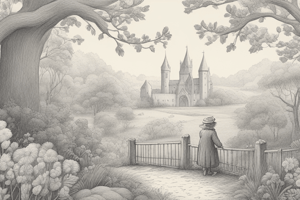Podcast
Questions and Answers
What is located between the arachnoid and pia mater?
What is located between the arachnoid and pia mater?
- Vascular pia mater
- Dentate ligaments
- Cerebrospinal fluid (correct)
- Epineurium
Where does the pia mater blend with the epineurium?
Where does the pia mater blend with the epineurium?
- Below the apex of conus medullaris
- Over the spinal nerve roots (correct)
- Above the foramen magnum
- Central in cauda equina
What is the structure that extends as filum terminale and is attached to the back of the coccyx?
What is the structure that extends as filum terminale and is attached to the back of the coccyx?
- Vascular pia mater
- Cerebrospinal fluid
- Pia mater (correct)
- Epineurium
What are the dentate ligaments?
What are the dentate ligaments?
How many dentate ligaments are there throughout the length of the spinal cord?
How many dentate ligaments are there throughout the length of the spinal cord?
Which artery supplies the spinal cord?
Which artery supplies the spinal cord?
Where is the first dentate ligament located?
Where is the first dentate ligament located?
Flashcards are hidden until you start studying
Study Notes
Spinal Meninges
- The spinal dura is pierced segmentally by the anterior and posterior roots of the spinal nerves as they exit the cord.
- The subarachnoid space is between the arachnoid and pia mater and is filled with cerebrospinal fluid (CSF).
- The pia mater is vascular and lines the anterior median sulcus, and is prolonged over the spinal nerve roots, blending with their epineurium.
- The filum terminale is a projection of the pia mater below the apex of conus medullaris, attached to the back of the coccyx.
Dentate Ligaments
- The dentate ligaments are special folds of the spinal pia mater that pierce the arachnoid to attach to the inner side of the dura.
- There are 18-24 dentate ligaments throughout the length of the spinal cord.
- The first dentate ligament lies above the foramen magnum between the vertebral artery and the spinal root of the accessory nerve (cranial nerve 11).
Blood Supply
- The spinal cord is supplied by branches of the vertebral and segmental arteries.
- The vertebral artery gives rise to anterior and posterior spinal arteries.
White Matter (Spinal Cord Tracts)
- The white matter of the spinal cord surrounds the grey matter and is made of axons.
- The bulk of the white matter is divided into three regions: anterior funiculus, posterior funiculus, and lateral funiculus.
- Each of these funiculi contains specific tracts.
Anterior Funiculus
- Ascending tract: anterior spinothalamic tract
- Descending tracts: anterior corticospinal tract, vestibulo-spinal tract, tecto-spinal tract, and reticulo-spinal tract
Lateral Funiculus
- Ascending tracts: posterior spinocerebellar tract, anterior spinocerebellar tract, lateral spinothalamic tract, and spino-tectal tract
- Descending tracts: lateral corticospinal tract, rubrospinal tract, and olivo-spinal tract
Posterior Funiculus
- Ascending tracts: gracile fasciculus and cuneate fasciculus
Spinal Nerves
- Spinal nerves are grouped in correspondence to the cord segments as: Cervical (C1-C8), Thoracic (T1-T12), Lumbar (L1-L5), Sacral (S1-S5), and Coccygeal (Co1).
- There are a total of 31 pairs of spinal nerves.
Cross Section
- The spinal cord has four surfaces: anterior, posterior, and two lateral surfaces.
- There are specific grooves that can be seen on these cord surfaces, including fissures and sulci.
Grey Matter
- The grey matter is the butterfly-shaped (H-shaped) central part of the spinal cord.
- It is comprised of neuronal cell bodies and is divided into anterior, posterior, and lateral horns (regions).
- The anterior (ventral) horn contains the cell bodies from which the axons of the anterior roots of the spinal nerves exit the cord.
Studying That Suits You
Use AI to generate personalized quizzes and flashcards to suit your learning preferences.



